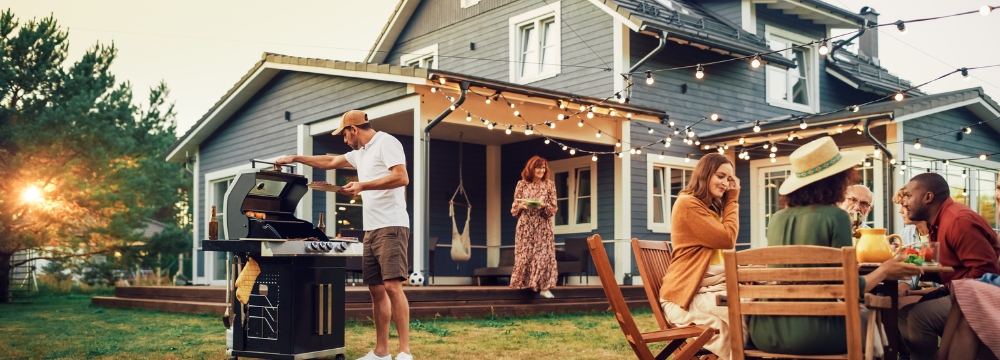
Just because you’ve made some significant modifications to your diet doesn’t mean you have to tiptoe around get-togethers. We’re social creatures, and being with people we care about is fundamental to our nature. If you’re wondering how you’ll go about sticking to your diet and not feeling overwhelmed with the menu while hanging out, we’re going to help you with a few pointers.
Socializing and Mental Health
Summer is in full swing, and for many, that means spending more time with friends – backyard hang time, weekend cookouts, or just catching up on the porch. These simple moments can lift your spirits and have a profoundly positive impact on your well-being.
Being around people you care about helps you feel connected and supported. Laughter, conversation, and shared memories offer a kind of emotional boost that’s hard to replicate on your own. Research supports this finding: positive social interaction is linked to lower stress, improved mood, and increased resilience over time.
Engaging in social activities creates a buffer against life’s daily challenges. Sharing stories, playing games, or simply enjoying each other’s company brings joy and calm that lasts long after the event.
So, if you’re feeling the pull to spend more time with friends this season, but feeling anxious about self-discipline and staying on track with your eating habits, be proud of how far you’ve come and know you’ve got this. Let summer be a time to recharge emotionally, one gathering at a time.
Gathering at Someone’s House
Backyard BBQs, game nights, or dinner with close friends can feel both exciting and a little nerve-wracking after bariatric surgery. You don’t want to be the odd one out, but you also don’t want to be the picky one. What do you do?
Consider having a brief discussion with your host ahead of time about what they may have planned. Share how excited you are about your new meal plan or recipes you’ve discovered that will blow their mind. You don’t have to go into deep details if you don’t want to – just a simple mention that you’re following a new eating routine will work.
Ask if you can bring something to add to their menu that also works well for you. Most people will appreciate the heads-up and won’t mind if you contribute a dish or two to the table. Bringing something you enjoy and know fits your plan is an easy way to alleviate the pressure. Whether it’s a high-protein dip, a fresh veggie platter, or something you can portion easily, having a go-to option can help you feel more at ease when the spread comes out.
Don’t skip meals beforehand. It might be tempting to “save up” calories before a gathering, but that can backfire. Arriving overly hungry can make it harder to make mindful choices. Instead, eat balanced meals earlier in the day to keep your energy and hunger in check.
When the food starts making its rounds, give yourself a moment to scan the table before filling your plate. Look for lean proteins, non-starchy vegetables, and dishes that aren’t heavy in sauces or added sugars. And remember, it’s perfectly okay to take small portions. You’re eating to feel good, not to match anyone else’s plate. On that note, if there’s a mix of plate sizes, choose the smaller one. It can help with portion control and make smaller servings look just right, not sparse.
It sounds simple, but positioning yourself away from the buffet or snack table helps reduce mindless nibbling. Once you’ve made your plate, shift your focus to the people around you. Make your first round count and eat slowly.
If someone offers you something you’re avoiding, it helps to have a polite response ready, such as “That looks great, but I’m sticking with lighter choices tonight,” or “I already found what I need, thank you!” Most people won’t push once they see you’re content.
Opting for a beverage rather than food can also help you feel full, give your hands something to do, and keep you hydrated.
Getting Comfortable with Restaurants
You don’t have to avoid eating out to stay on track – you just have to be mindful. With a bit of planning ahead, you can enjoy a good restaurant and still stick to your goals.
Start by checking out the menu ahead of time. Most restaurants post their offerings online so you can go in with a game plan. Look for grilled or baked proteins, veggie sides, and dishes that aren’t loaded with heavy sauces or breading. Knowing what you’ll order before you walk in makes it easier to avoid impulsive choices when you’re hungry, feeling rushed, or distracted by good company.
Don’t be afraid to speak up when ordering. Most restaurants are accustomed to special requests, so feel free to ask for your meal to be prepared a certain way, such as skipping the bun, holding the sauce, or substituting fries for a side salad.
Portion sizes can be generous, so consider sharing an entrée with a friend or asking for a to-go box to take home with your meal. That way, you can set aside what you don’t plan to eat before digging in.
If the group is ordering appetizers or shared plates, see if there’s something that fits your plan, or keep some lemon water closer to you than the food so you’ll reach for that instead of a bite. You can also keep an eye out for the server and excuse yourself to the restroom before they get to the table – that way, it’s already been picked over before you get back!
Listen to your body by eating slowly, chewing well, and taking breaks. Once you feel satisfied, permit yourself to stop, even if there’s food left on your plate. Remember that to-go box you got at the beginning? Just put the rest in it.
With the right mindset and a little pre-gaming, you can feel proud of the choices you make and still be fully present at the table.
Making the Most of It
Most importantly, focus on the experience. Chatter, laughter, and connection are what make these gatherings special, not what’s on your plate. With a bit of planning, a dash of self-discipline, and a lot of self-trust, you can enjoy these moments along with everyone else. If you need help with nutritional guidance or meal planning, please contact our team.










